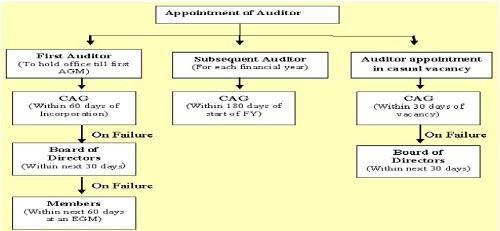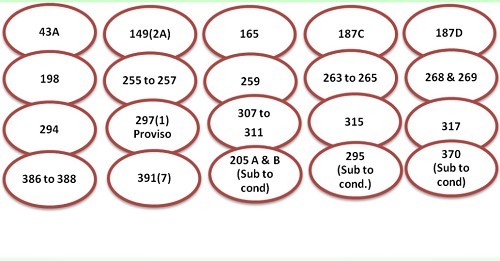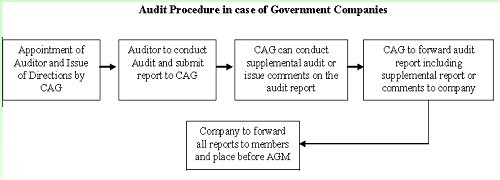PROVISIONS RELATING TO GOVERNMENT COMPANIES UNDER THE COMPANIES BILL 2012
Companies Bill 2012 which seeks to replace the Companies Act of 1956 has brought with it dramatic changes in almost all arenas of company administration and management. The bill has proposed some new provisions for government companies as well. In the present write up, the provisions relating to Government companies as proposed in the Companies bill 2012 have been analyzed in comparison to the Companies Act of 1956.
DEFINITION OF GOVERNM ENT COMPANY:
Clause 2(45) of the Companies Bill 20 12 defines a Government Company as “Government company” means any company in which not less than fifty one percent of the paid-up share capital is held by the Central Government, or by any State Government or Governments, or partly by the Central Government and partly by one or more State Governments, and includes a company which is a subsidiary company of such a Government company” Section 2(18) of Companies Act, 1956 defines Government Company as – “Government Company” means a Government Company within the meaning of Section 617.
Section 617 define s a Government company to mean – “Government Company means any company in which not less than fifty-one per cent of the paid-up share capital is held by the Central Government, or by any State Government or Governments, or partly by the Central Government and partly by one or more State Governments and includes a company which is a subsidiary of a Government company as thus defined.”
From the above it is clear that there is no change in the definition of a Government Company under the Companies Bill, 2012 a s compared to the Companies Act 1956.
APPLICABILITY OF PROVISIONS TO GOVERNMENT COMPANIES
All the provisions of the Companies Bill 2012 apply in the same manner to a Government company as that to any other company except for provisions which are specifically exempted under the Act itself or where a provision different from other companies has been specifically prescribed. Additionally, Clause 462 of the Bill gives a universal power to the Central Government to direct by means of notification that any of the provisions of this Act,—
(a) shall not apply to such class or classes of companies; or
(b) shall apply to the class or classes of companies with such exceptions, modifications an d adaptation s as may be specified in the notification.
Under the Companies Act, 1956, Section 620 empowers the Central Government to exempt any provisions of the Companies Act, 1956 from being applicable to Government Companies by gazette notification except Section 619.
Given below is a list of Sections under Companies Act which are not applicable to Government Companies i.e. which have been exempted by means of gazette notifications issued from time to time:
Prohibitions and restrictions regarding political contributions
As per Clause 182 of the Bill, a Government Company is prohibited from making contributions to any political party, directly or indirectly.
Appointment of Auditor
Clause 139 of the Bill contains that Auditor for a Government Company, in respect of each financial year will be appointed by the Comptroller and Auditor General of India within 180 days of the commencement of the financial year. The person to be appointed should be an auditor duly qualified to be appointed as an auditor of companies under this Act and he shall hold office till the conclusion of the ensuing annual general meeting of the company.
Procedure for appointment of auditors
First Auditor – The First Auditor for a Government Company shall be appointed by the CAG within 60 days of incorporation, failing which the Board of Directors of the Company can appoint the first auditor within the next 30 days and failing which also, the members of the Company can appoint the auditor in a general meeting within the next 60 days.
Appointment of Auditor in casual vacancy – In case of any casual vacancy in the office of the auditor of a Government company, the CAG will fill the vacancy within 30 days failing which the vacancy needs to be filled by the Board of Directors within the next 30 days.

Audit procedure
In case of Government companies, CAG will direct the auditor about the manner in which the audit has to be conducted. Auditor will submit his audit report to the CAG along with directions issued by CAG, actions taken by the auditor and its impact on financial statements of the company. On receipt of the audit report, CAG can conduct a supplementary audit or comment upon/supplement the audit report. Company is required to forward the comments of the CAG to all people entitled to receive financial statements of the company and also place it in the AGM. CAG is also authorized to conduct test audit of any Government company or other companies which are owned or controlled by Government, directly or indirectly, by issuing an order in this behalf and the report generated out of such audit will be presented by the CAG to the concerned State or Central Government who in turn will lay it before the State Legislature or Both Houses of Parliament, as the case may be, respectively.

List of Sections which apply with modifications –
• Section 13
• Sections 16, 17 & 18
• Section 21
• Section 23
• Sections 100 to 103
• Sec 108 & 108 (1)
• Sec 166
• Sec 209(3)(b)
• Section 372
• Sec 392(1)
• Sec 394
• Sec 621
ALLOCATION OF SEPARATE SECTIONS FOR GOVERNMENT COMPANIES
While the Companies Act,1956 had sections earmarked separately to deal with specific provisions governing Government Companies, namely sections 617 to 620, in the Companies Bill 2012, the provisions pertaining to Government Companies are provided in the same clauses as that of nongovernment companies except for two clauses 394 and 395 which deal with provisions relating to annual report of Government Companies.
PROVISIONS OF COMPANIES BILL RELATING TO GOVERNMENT COMPANIES
Appointment of Nominee Director
As per Clause 161(3), the Central or State Government may nominate any person as director on Board of a Government Company by virtue for their share holding in that company, subject to provisions of Articles of Association.

Annual Report of Government Companies
For each Government company, the concerned Government is required to cause annual report to be prepared, on working and affairs of that company, within three months of the annual general meeting in which the audit report along with supplemental report or comments of CAG are placed and the said annual report will be placed, as soon a s the report is ready:
- In case of Government companies in which only Central Government is a member - before both Houses of Parliament together with a copy of the audit report and comments upon or supplement to the audit report, made by the Comptroller and Auditor-General of India,
- In case of Government companies in which only State Government is a member – before the House or both Houses of the State Legislature together with a copy of the audit report and comments upon or supplement to the audit report,
- In case of Government companies in which both Central and State Government are members - before both Houses of Parliament and before the House or both Houses of the State Legislature together with a copy of the audit report and comments upon or supplement to the audit report.
Government Companies under liquidation (Refer Clause 294)
- Provisions regarding annual report as mentioned above shall also apply to all Government companies which are under liquidation.
- In case of audit of accounts of a Government company which is under liquidation, the official liquidator shall forward a copy of the audit report to the Central or State Government or to both as the case may be.
- In case the liquidation proceedings of a Government company are not concluded within a period of one year, then the official liquidator is required to prepare a statement with respect to the proceedings in, and position of, the liquidation, get the same duly audited and file a cop y thereof to the Central or State Government or both, as the case may be.









 CAclubindia
CAclubindia
